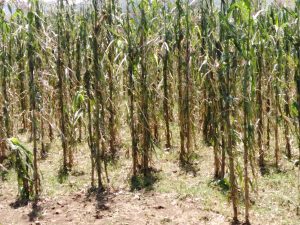ESSP Working Paper 130, by Timothy Thomas, Paul Dorosh, and Richard Robertson.
Abstract: We present results of model simulations of maize, wheat, and sorghum yields in Ethiopia through 2085. The analysis draws on climate outcomes from 32 global climate models and an agronomic crop model to estimate effects on the yields of these cereals of expected higher temperatures and, for most of Ethiopia, increased rainfall. The simulation results suggest that climate change will likely have only relatively small effects on average yields of maize, wheat, and sorghum in Ethiopia up to 2055, as agronomic conditions for cultivation of these crops may actually improve in large parts of the country. Nonetheless, yields will need to increase over time to enable cereal production to keep pace with expected demand growth due to increases in population and per capita incomes. Moreover, even if future changes in climate have only moderate impacts on average crop yields in Ethiopia, there is growing evidence that weather outcomes are likely to become more variable in the future, implying that severe droughts and floods may very well have a greater impact on cereal production in the future than in the past. Download the PDF.
